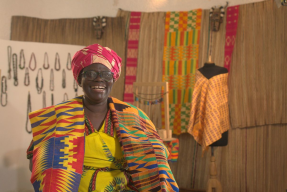On avian appetites and accidental entrepreneurs…
February 24, 2012Heather Sullivan | KF 17 | Indonesia
Nearly every Kiva Fellow will tell you that meeting borrowers is one of the greatest satisfactions of serving “in the field.” It’s a delight to sit down with a group of borrowers and hear them talk about their families, their small businesses, their challenges, and their accomplishments. Quite possibly, local snacks will be involved; if you’re lucky, the snacks will not only be “locally sourced” but indeed specialty confections made from scratch by one of the borrowers. (In Kiva Fellow lingo, this is called “eating the profits” — all the better if the edible profits are green!)
Es PIsang Ijo, banana in a green “robe” served with delicious coconut cream.
Hugs and kisses from ebullient borrowers, group photos with the goofy-looking bule (Indonesian for “foreigner”), plantains in green robes — all good stuff. Even more rewarding, though, are the glimpses into how individuals and their loans fit into the local culture and economy.
Take, for example, my recent visit to Ibu Nuryinah, a borrower with Kiva partner (and my host) VisionFund Indonesia. In preparing for my meeting with Nuryinah, I was intrigued to see that she planned to use her loan “to pay for materials to make a cricket cage.” While I had visions of a sort of batting cage for cricket players, the fact that the loan was listed as “agricultural” suggested a different kind of business and a different kind of cage — cricket cages of the insect variety.
Nuryinah entered the cricket business only recently. As it turns out, one of her friends raised crickets and wasn’t able to meet the growing demand one month. Nuryinah decided she would try her hand at it, and with the assistance of VisionFund loans, she has expanded her operations considerably to 120 cages. (Nuryinah is in her second cycle of loans with VisionFund, and her first cycle as a Kiva borrower.)
Because she seems to be passionate about her business, I found it interesting that she was something of an accidental entrepreneur. I’ve been pondering the role of “enterprise” in microfinance recently; while microcredit has traditionally emphasized entrepreneurial endeavors, critics have observed that everyone is not born an entrepreneur. Particularly in areas where the formal economy is weak, running a small business may be a function of limited opportunities rather than an expression of entrepreneurial zeal.
In that light, I was intrigued to hear how Nuryinah had recognized and seized an opportunity to enter a niche market; within a fairly short period of time, she has not only acquired specialized expertise, but has also developed and expanded her business. While her entry into this specialized agricultural sector may have been unplanned, Nuryinah brings a visible passion to her acquired trade. It strikes me that she’s a natural enterpreneur even if an “accidental” cricket farmer.
We toured the cricket cages, and Nuryinah provided an animated explanation of cricket reproduction and development, showing off soil samples with crickets at various stages of development.
All very cool and interesting. Still, where’s the money in crickets?
It turns out that the crickets are bred and harvested as birdfood. Surely birds need to eat, but it wasn’t immediately obvious how avian appetites could fuel a robust market in crickets. As it turns out, Nuryinah’s crickets provide sustenance to Indonesia’s professional class of songbirds. We’re talking competitive crooners, not the amateurs croaking out warbly songs at backyard feeders. There’s a rich tradition of bird-keeping in Javanese society and competition songbirds can deliver some serious prize money. Even a diva’s gotta eat…
Heather Sullivan is a Kiva Fellow stationed in Jakarta, Indonesia, working with VisionFund Indonesia. Join others lending to Indonesia entrepreneurs, join the Indonesia lending team.
PREVIOUS ARTICLE
Kiva Scholar: Financial Inclusion →NEXT ARTICLE
Week in Review: Let's Talk About Connections →
















